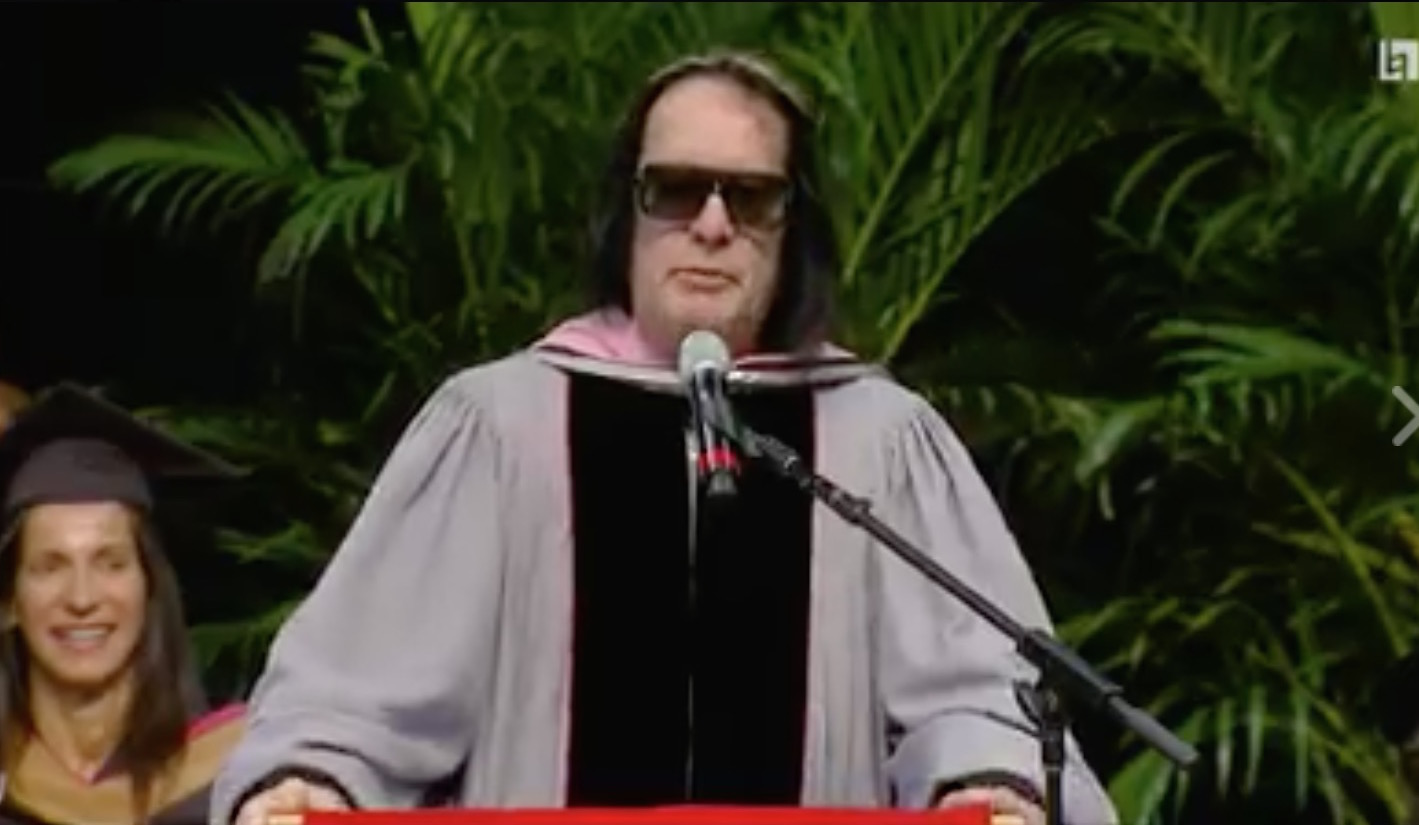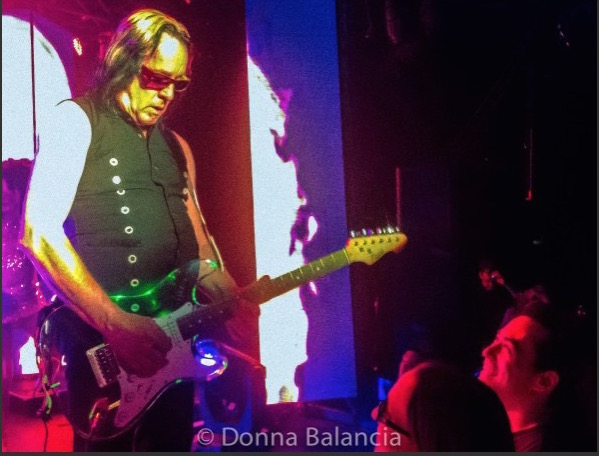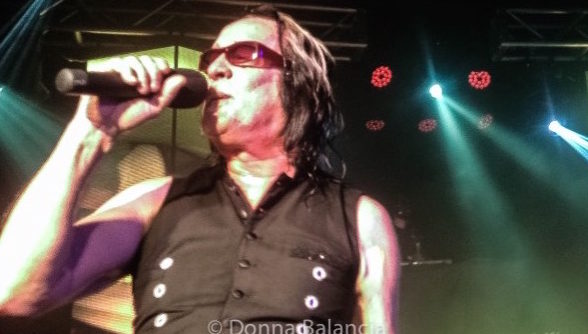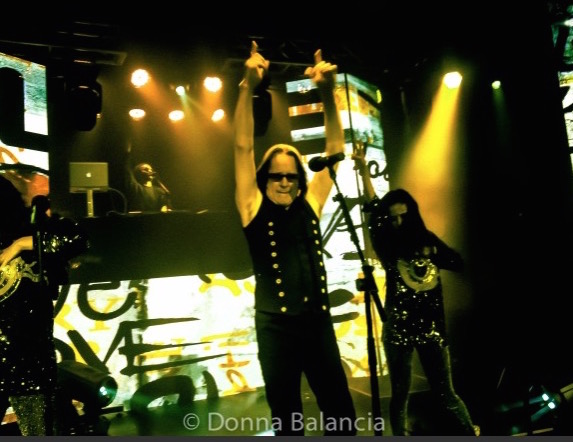
Prolific Musician Addresses Berklee Commencement
By TODD RUNDGREN
“I barely graduated high school, I did not go to college, I did not qualify for a music school of the caliber of Berklee; I never would have passed the audition. And to this day I don’t know how to read music.
Compound that with the fact that I’ve never had a No. 1 record, single or album, personally, I’ve never been nominated for a GRAMMY; I’ve never been nominated, thankfully, for the Rock Hall of Fame, if nominated I will not run and if elected I will not serve.

The Story is The Thing
And so I came to the conclusion the only thing I can possibly give you is my story and let you draw your own conclusions from that.
The one thing I did know growing up is I was a musician and it was apparent to everyone around me. Unfortunately I grew up in an environment where that was not necessarily a priorty.
I was a horrible student. I only wanted to do things that interested me in school and as soon as I lost interest I was disruptive and that continued for pretty much my entire so-called academic life until I just barely graduated high school found myself on the street. And there were two things I could do at that point. I could try and get a job and generate enough money to go to an engineering school to learn to program computers or I could take my chances as a musician and I spent a few weeks on the street and fortunately I found my way into a band in Philadelphia.
At the time I was a guitar player and guitar was my obsession, literally my obsession. It was the only thing that mattered in my life I didn’t think about songwriting I had yet to write a song, I didnt feel qualified to be a frontman or a singer, the guitar suited me well and I was able to develop enough technique to impress the people around me and get a job in a local blues band which is what I did.

‘Upheaval in The Music Business’
That didn’t last very long because there was a lot of upheaval in the music business and everybody in my band which originally modeled after the Paul Butterfield Blues Band, a bunch of white people playing black music, to a band of white people taking acid as soon as they discovered the Grateful Dead they wanted to go to the country and get their heads together … I started a band called The Nazz, which lasted about 18 months and then I found myself on the street again.
And this is probably a more pivotal moment than when the Nazz got discovered, but by the time I found myself on the street I probably didn’t even have a guitar any more. I was still a musician but I didn’t have an instrument to play, and I took any job I could get. I would up designing lights in a discotheque and living with clothiers in the West Village, which later affected my sense of style by the way.
But I was fortunate that I had left some good work and was asked to join the Albert Grossman Organization, which was essentially a repository for some of the greatest acts in the world … and they were just starting to get into the record business they asked me to come in and interface with a lot of the old folk acts who had yet to get updated to the 60s, which is when this all happened. And I got paired up with acts like Ian and Sylvia, and James Cotton and all of these legacy artists…
My big breakthrough was when I was involved in the production of Stage Fright The Band’s third album, and from there I became a successful producer.
At one point I got the bug to make a record of my own. A vanity project, I had no intention of becoming a performer. I just felt I had earned the right to make a record for myself. I was still writing, learning abour writing actually. I made a record it had a minor hit We Gotta Get You a Woman it played here in Boston until militant feminists misunderstood the lyrics and threatedned to bomb the station, so the record only got so high and then dropped off.
At first I was not a performer at all, I had no idea what it was like to take my music on the road and perform it for people and when I first performed I couldn’t get through a 20-minute set without blowing my voice out, that’s how far behind the performance curve I was.
But I perservered at that and I perservered at the songwriting and eventually I had a breakthrough, it was called Something / Anything. And while it had several singles on it the biggest thrill for me was when I met Wolfman Jack, who had a half a million watt radio station broadcasting out of Tijuana which he did from his home in LA and he became my champion and that helped me a lot because he could reach Chicago from Tijuana, which wasn’t legal for any American radio station. Something Anything was a big boon to me. But then people started referring to me as the male Carol King. And I was a Carol King fan, but it bothered me to be compared to somebody else. You don’t want to be compared to other people you want people to be compared to you.
I went completely a 180-degree direction. Was pilloried by the label as well as the critics for not following up the success of Something/ Anything. But there were two things to keep in mind I was a successful record producer so I didn’t have to fret about the success of my own records and secondly I started to see music as something as something different than what I previously assumed. I was writing what everyone was writing what everyone else was writing, I had plumbed a relationship I had in high school for three whole albums and suddenly realized I didn’t care about this girl any more. What am I doing?

‘Use Your Experience’
And I also realized there were a lot more things in my head from my experience. My dad hated rock and roll, and we didn’t play it in the house, but I would get to hear Ravel, I would get to hear Bernstein, Gilbert and Sullivan a broad range of stuff … I didn’t realize that that was a significant part of my musical makeup and that I was writing like a hypocrite. And so I made this crazy record called A Wizard a True Star in which I threw out all the rules of record making and decided I would try to imprint the chaos in my head onto a record without trying to clean it up for everyone else’s benefit. The result was a complete loss of about half of my audience at that point.
But … Trent Reznor and other artists have cited that as being a major influence on them and so I have a special pride for what essentially was my act of tyranny after having achieved commercial success. This became the model for my life after that. The irony was that I never learned anything in high school but when I got out of high school I learned to learn. Ever since then I have absorbed anything that can be put in front of me that is of interest. I so I learned not only how to expand my range of musical expression. But I also learned things like computer programming and video production, and other sorts of things any of you can absorb if you don’t leave here thinking your education is finished.
Today this appears to be the end of something, but It’s really the beginning of something for you. I recognize there’s great loss associated with this ceremony as well as triumph. There are friends you may be saying goodbye to that you might never see again in your life, but the most important thing you can take advantage of in the world of music is to see yourself. I eventually got to the point that music meant to me self exploration more than anything else. I could objectivize my ideas and listen to them and see if I was full of crap or not or if I might be in the right direction and I encourage everyone here to be brave in that respect. To be fearless in that respect. I have lost the ability to be insulted by critics.
You never know the actual impact of what you do today and how it will actually turn out in the future. That album A Wizard A True Star, which was such an abomination to everyone at the time it came out, eventually became a signature moment in my career and I hope everyone will feel the freedom and the fearlessness to undertake that when the time comes because you may find that’s your defining moment.”
